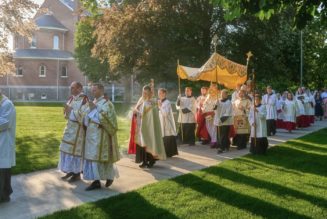
The Gospel for the Fourth Sunday in Ordinary Time, Year C, teaches a lesson that is very relevant to our time: The people who are most familiar with Jesus are the same ones who reject him — and even want to do away with him.
We see that in the Church in the West, and we see it in our own lives. But there is an answer, and that answer is immensely freeing.
The Gospel this Sunday begins by repeating the “mic drop” line that ended last Sunday’s Gospel.
After reading Isaiah’s prediction of the Messiah, the son of David, who will preach the Good News to the poor, proclaim liberty to captives, and restore sight to the blind, Jesus says, “Today this Scripture passage is fulfilled in your hearing.”
We see later in the Gospel how other people will respond to this good news. Later in Luke, for instance, a blind beggar will simply hear that he is passing by in a crowd. His response will be to cry out “Jesus, Son of David, have mercy on me!” At another time, the woman with the hemorrhage will push through a crowd just to touch him.
But this crowd doesn’t respond that way. “They rose up, drove him out of town, and led him to the brow of the hill on which their town had been built, to hurl him down headlong,” says the Gospel.
Why such a radically different reaction?
First, they don’t respect him because they have grown too familiar. “Isn’t this the son of Joseph?” they said, amazed at his words. It is like Jesus was the father and they were the older brother in the story of the Prodigal Son. “Son, you are with me always, and all that is mine is yours,” says the father. That wasn’t good enough for the older brother. The people of Nazareth had Jesus, and everything he had was theirs, his whole life — but that wasn’t good enough for them. Familiarity bred contempt.
This is precisely what has happened with the Church in the West. People got used to having Jesus Christ around, and so we took him for granted. The Church — priests, catechists and, just as bad, parents — stopped teaching their children key doctrines: the necessity of baptism, the glory of the Eucharist, the beauty of confession, the crucial need for prayer.
Second, Jesus’s townspeople started to love what was “their own” above what was God’s will. “Do here in your native place the things we heard were done in Capernaum,” they said, according to Jesus. He compares them to those stories in the Old Testament when prophets did great works of God in other lands — but not for their own people.
Today, Catholics also prefer what serves “our own.” We belong to political and cultural tribes, and partisanship and parochial concerns dominate our concerns. When people of our political stripe are offended by the teachings of Christ, we drop the teachings.
And then something unbearably sad happens.
It may seem extreme that the people in Nazareth wanted to hurl Jesus off a cliff, but that is what we do in a different way.
It goes like this: First, we fear Christ will offend others and soon, we are deciding that Christ offends us. First, we stop insisting on the doctrines we don’t like, and soon, we are actively undermining them. First, we try to fit Jesus into our political party or cultural milieu; soon, when Jesus interferes or disagrees, we drop Jesus. We do all we can to get him out of our lives — we do the equivalent of trying to drop him off a cliff.
And how does he respond? Eventually he does what he does in Sunday’s Gospel: “Jesus passed through the midst of them and went away.” Jesus doesn’t insist his friends love him. He doesn’t demand they accept him; he doesn’t hijack their freedom. He doesn’t let them eliminate him, either. He just walks away.
That’s what he does for Catholic institutions — including the institution of the family — that reject and deny him. He lets us have the clever human solutions we prefer to him. He lets us be the enthusiastic partisans we want to be, at the expense of our relationship with him. And he leaves.
To return to the analogy, Sunday’s Gospel is what it would look like if the father were the one who left: It is Jesus taking the inheritance of grace he had offered, and walking it away to a far country. Jesus will forgive anything, but too many Catholics who should have known better are guilty of the one sin he can’t forgive — the sin against the Holy Spirit, the refusal to repent.
What can possibly be done?
The first reading reminds us that it isn’t only sad for us when Jesus walks away. It is sad for him. “Before I formed you in the womb I knew you,” God tells Jeremiah. “Before you were born, I dedicated you. A prophet of the nations I appointed you.”
He wants so much for us — and expects so much from us. St. Paul for the last several weeks has been explaining all the gifts of the Holy Spirit meant to make this happen — gifts of prophecy and mighty deeds, speaking in tongues and healing.
This Sunday, he tells us the one gift we all have access to — love. Not love that “seeks its own interests,” doing good to get something back — because that’s not love at all. Real love. Real love isn’t “pompous” and “inflated” the way our cultural ideologies are. It isn’t “jealous,” “rude,” and “quick-tempered” like our political discourse. It isn’t a self-centered love, that is unkind, impatient and “broods over injury.”
What is it then?
- Real love “bears all things,” serving even those people who only offer negativity in return.
- Real love “believes all things,” accepting the Church’s doctrines, even the ones that make us uncomfortable, ready to change for the sake of the Truth rather than asking the Truth to change for us.
- Real love “hopes all things,” knowing that God is the master of all, even when all looks lost. He is the one who wins the war after losing every battle, and his slow and sure ways are better than the shortcut answers that seem expedient.
- Real love “endures all things,” sticking with Jesus Christ crucified, come what may, through suffering and persecution.
And that’s the way out of the malaise of the Church today.
Too many Catholics rejected too many truths — we even rejected repentance, and so Jesus is walking away.
But we can turn the situation around with love; real love of God that asks forgiveness, real love of each other that forgives, and real love of neighbor that serves, for free.
Join Our Telegram Group : Salvation & Prosperity









